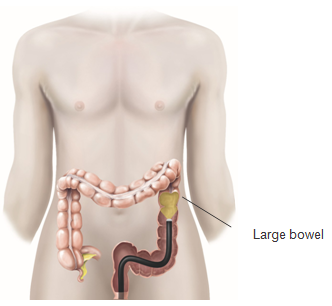Colonoscopy at The Holly Hospital
- Overview
Or call us on
A colonoscopy is a procedure to look at the inside of the large bowel (colon) using a flexible telescope.
What is a Colonoscopy?

A colonoscopy is a test that allows a consultant to look at the inner lining of your large intestine (rectum and colon). We use a thin, flexible tube called a colonoscope to look at the colon.
What are the benefits of a colonoscopy?
A colonoscopy helps identify conditions such as:
- ulcers
- colon polyps
- tumours
- areas of inflammation.
Is a colonoscopy right for me?
A colonoscopy can help to explore possible causes of:
If you’re over 50 your doctor may recommend a colonoscopy every 10 years, or sometimes sooner, to screen for colon cancer. Even if you have no other risk factors, age can increase your risk of getting colon cancer.
If you’ve had polyps before, a follow-up colonoscopy can find and remove any additional polyps. This is done to reduce your risk of colon cancer.
What happens during a colonoscopy?
Preparing for a colonoscopy
Before a colonoscopy, you’ll need to clean out (empty) your colon. If your colon lining isn’t clear of solids or liquids, then the colonoscope may not have a clear view of the rectum.
2 days before your colonoscopy – eat a low-fibre diet to help keep your colon clear.
The day before your colonoscopy – your doctor will ask you to drink laxative sachets to empty your bowels. You’ll probably get diarrhoea a few hours after taking the first sachet, so it’s best to be at home all day so that you’re close to a toilet.
The day of your colonoscopy – you’ll take the last dose of the laxatives before coming to the hospital. It is endorsed by the British Society of Gastroenterology to start the last dose of bowel preparation within 5 hours of colonoscopy as this improves bowel cleansing results. You may continue to drink until 2 hours before your procedure time.
During a colonoscopy
If appropriate, the endoscopist may offer you a sedative or painkiller. The procedure involves placing a flexible telescope into the back passage and blowing some air into the large bowel to get a clear view.
The endoscopist will be able to look for problems such as inflammation or polyps. They will also be able to perform biopsies and take photographs to help make a diagnosis.
A colonoscopy usually takes 30-45 minutes.
Is the procedure painful?
You may feel the camera going in, but it shouldn’t be painful. You may also experience bloating or stomach cramps, which are normal reactions. You may be given sedatives, painkillers or gas and air before your colonoscopy to help you feel more comfortable.
Recovery after a colonoscopy
If you were given a sedative, you will normally recover in about two hours. You should not drive for 24 hours and so you should arrange for somebody to take you home. You should also not drink alcohol or sign any legal documents for 24 hours.
You may feel a bit bloated for a few hours but this will pass.
You should be able to go back to work the day after the colonoscopy.
If you did not have a sedative, you can go home and do everything as normal.
Are there any potential complications?
Although unlikely, there is a risk of certain complications, including:
- Damage to the colon
- Bleeding
- Vision going blurry
- Infection
- Not completing the procedure sufficiently
- Irregularities of the heart
- Breathing problems
Colonoscopy Information leaflets:
Gastroscopy with Colonoscopy aftercare advice
Therapeutic procedures offered: Polypectomy, Endoscopic Mucosal Resection, Banding of haemorrhoids, Argon Plasma Coagulation, Dye Spray, Dilatation, Insertion of metal stent and Botox injection.
Book now
If you would like more information on a colonoscopy please call us on 020 8505 3311 or fill in the form below.
Colonoscopy consultants at The Holly Hospital
High Road, Buckhurst Hill, Essex, IG9 5HX
Our car park operates a Pay and Display system.
Ways to pay
Nuffield Health promise
Our prices are all-inclusive. We will equal any comparable price. There are no time limits on your aftercare.
Paying for yourself
There are no hidden costs in our treatment prices. The price you see is the price you pay.
Find out morePersonal medical loan
Spread the cost of your treatment with a 6, 10 or 12 month 0% personal medical loan.
Find out moreMedical insurance
We work with you and your insurance provider to get you the treatment you need quickly
Find out moreContact The Holly Hospital
